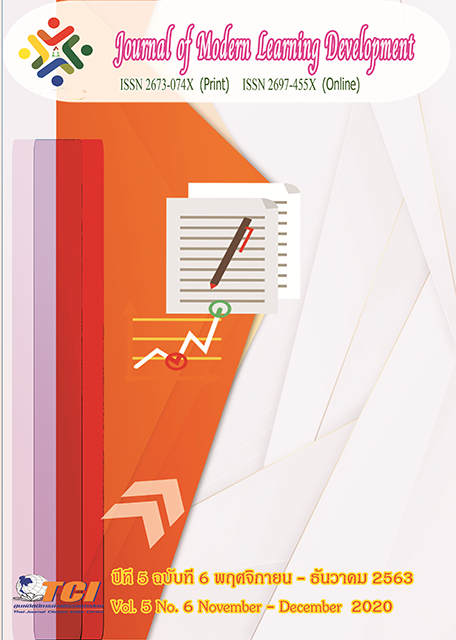Reasons for non-payment of the Student Loan Fund (SLF.) of the defendants in Khon Kaen District Court, Khon Kaen Province
Main Article Content
Abstract
A topic of considerable debate is why Student Loan Fund’s debtors do not repay on schedule. Consequently, this research aimed to explore the reasons for non-payment of the Student Loan Fund (SLF.) of the defendants in Khon Kaen District Court, Khon Kaen Province. The research is based on qualitative research methodology by using document review and key informant interview. Ten respondents were selected by purposive sampling technique, including five SLF officers and five SLF debtors.
The results show that there are multiple reasons for the defendants' failure to repay the SLF loan on schedule. First of all, the debtors believe that the government will forgive the debt or will not collect the debt, so they simply ignore the repayment obligation. Secondly, there is a belief among some groups of debtors that anyone who repays the debt is a fool. Thirdly, the interest rate on the principle is low, and can be paid at any time. Next, many debtors have other liabilities which they feel are higher priority. Likewise, many of them understand that the repayment of SLF loan can be extended over a long period of time, so they postpone the matter. Furthermore, some of the students passed their debt to the sureties. Also, many of the debtors did not find a stable job after completing their studies and, thus, did not earn the expected income to pay off the loan. Moreover, some of the debtors did not complete their requirements for graduation. By contrast, some debtors are in the process of consolidating their debts and arrange a repayment plan. In addition, several debtors did not clearly understand the requirements of the loan and the repayment collecting process. Finally, there was a lack of publicity about loan repayment with accurate and complete information.
Article Details
References
กองทุนเงินให้กู้ยืมเพื่อการศึกษา (กยศ.). (ม.ป.ป.). วิสัยทัศน์ ค่านิยม พันธกิจ และเป้าหมาย. ออนไลน์.
สืบค้นเมื่อ 28 ตุลาคม 2563. แหล่งที่มา www.studentloan.or.th/th/aboutus/1539000635
ชาย โพธิสิตา. (2552). ศาสตร์และศิลป์แห่งการวิจัยเชิงคุณภาพ. (พิมพ์ครั้งที่ 4). กรุงเทพมหานคร: อมรินทร์พริ้นติ้งแอนพับลิชชิ่ง.
ณัฐวิน อัศวภูวดล. (2559). ปัญหาการใช้คืนเงินกองทุนให้กู้ยืมเพื่อการศึกษาตามพระราชบัญญัติกองทุนให้กู้ยืมเพื่อการศึกษา พ.ศ.2541. Journal of nakhonratchasima college, 10(1), 135-144.
บีแอลทีแบงค็อก. (2560). พ.ร.บ. หนี้ กยศ. ไม่จ่ายไม่ได้แล้ว. ออนไลน์. สืบค้นเมื่อ 29 ตุลาคม 2563. แหล่งที่มา www.bltbangkok.com/news/4179/
ผู้จัดการออนไลน์. (2551). กยศ.ร่วมศาลแขวงขอนแก่น ไกล่เกลี่ยลูกหนี้ค้างชำระกว่า 5,400 ราย. ออนไลน์. สืบค้นเมื่อ 29 ตุลาคม 2563. แหล่งที่มา mgronline.com/local/detail/9510000151421
พงษ์พันธุ์ พลเยี่ยม (2543). การติดตามการดำเนินงานกองทุนเงินให้กู้ยืมเพื่อการศึกษา จังหวัดขอนแก่น ปีการศึกษา 2541. วิทยานิพนธ์ปริญญาศึกษาศาสตรมหาบัณฑิต สาขาวิชาการบริหารการศึกษา. บัณฑิตวิทยาลัย: มหาวิทยาลัยขอนแก่น.
วิจิตรา ทินพนาสวัสดิ์. (2549). ปัจจัยที่มีผลต่อการชำระหนี้คืนเงินกองทุนเงินให้กู้ยืมเพื่อการศึกษา (กยศ.): กรณีศึกษานักศึกษามหาวิทยาลัยรามคำแหง. สารนิพนธ์หลักสูตรปริญญาเศรษฐศาสตรมหาบัณฑิต.บัณฑิตวิทยาลัย: มหาวิทยาลัยรามคำแหง.
สุดท้าย ชัยจันทึก. (2560). การพัฒนารูปแบบการให้เงินกู้ยืมเพื่อการศึกษาของภาครัฐ ในระดับอุดมศึกษาของประเทศไทย. วารสารบัณฑิตศึกษามหาวิทยาลัยราชภัฎสกลนคร. 14(65). 173-192.
เสกสรรค์ บุญรอด. (2553). การประเมินผลและความพึงพอใจของนักศึกษาระดับอุดมศึกษาต่อกองทุนเงินให้กู้ยืม เพื่อการศึกษา: กรณีศึกษาสถาบันการศึกษาระดับอุดมศึกษา. วารสารวิชาการและวิจัย มทร.
พระนคร, 4(2), 27-39
อมรา ติรศรีวัฒน์. (2559). การผิดนัดชำระเงินกู้ยืมเพื่อการศึกษาในประเทศไทย: ปัญหาและแนวทางในการแก้ไข. วารสารวิชาการบริหารธุรกิจ, 5(1), 121-144.
Ratchagit, T. (2019). การศึกษา (Education) สำคัญอย่างไรกับการพัฒนาทรัพยากรมนุษย์. ออนไลน์. สืบค้นเมื่อ 29 ตุลาคม 2563. แหล่งที่มา https://th.hrnote.asia/orgdevelopment/190625-education-for-hrd/
Thaiquote. (2559). ผุดมาตรการสร้างแรงจูงใจใช้หนี้คืนกู้ยืม “กยศ.”. ออนไลน์. สืบค้นเมื่อ 29 ตุลาคม 2563. แหล่งที่มา www.thaiquote.org/content/200966


